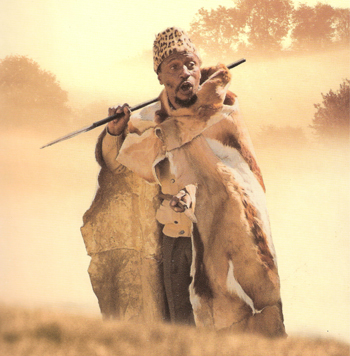Oral Literature in Africa
Read Oral Literature in Africa Online
Authors: Ruth Finnegan


ORAL LITERATURE IN AFRICA

The praise singer Mqhyai, distinguished Xhosa imbongi, in traditional garb, with staff (courtesy Jeff Opland).
World Oral Literature Series: Volume 1
ORAL LITERATURE IN AFRICA
Ruth Finnegan


Open Book Publishers CIC Ltd.,
40 Devonshire Road, Cambridge, CB1 2BL, United Kingdom
http://www.openbookpublishers.com
© 2012 Ruth Finnegan. Forward © 2012 Mark Turin.
This book is licensed under a Creative Commons Attribution 3.0 Unported license (CC-BY 3.0), details available at
http://creativecommons.org/licenses/by/3.0/

This license allows you to share, copy, distribute and transmit the work; to adapt the work and to make commercial use of the work. The work must be attributed to the respective authors (but not in any way that suggests that they endorse you or your use of the work).
This is the first volume in the World Oral Literature Series, published in association with the World Oral Literature Project.
World Oral Literature Series: Volume 1.
ISSN: 2050-7933
Digital material and resources associated with this volume are hosted by the World Oral Literature Project (
http://www.oralliterature.org/collections/rfinnegan001.html
) and Open Book Publishers (
http://www.openbookpublishers.com/product/97
).
ISBN Hardback: 978–1-906924–71-3
ISBN Paperback: 978–1-906924–70-6
ISBN Digital (PDF): 978–1-906924–72-0
ISBN Digital ebook (epub version): 978–1-906924–73-7
ISBN Digital ebook (mobi version): 978–1-906924–74-4
Cover image: West African epic singer with lyre, probably Mandingo or Fula (courtesy Anne-Marie Dauphin and Jean Derive).
Typesetting by
www.bookgenie.in
All paper used by Open Book Publishers is SFI (Sustainable Forestry Initiative), and PEFC (Programme for the Endorsement of Forest Certification Schemes) Certified.
Printed in the United Kingdom and United States by
Lightning Source for Open Book Publishers
To all my teachers
and to all those students
who may find this work of some use in their
study of the oral literatures of Africa
and of the world
Ruth Finnegan
is a Visiting Research Professor and Emeritus Professor in the Faculty of Social Sciences at the Open University. Her particular interests are in the anthropology/sociology of artistic activity, communication, and performance; debates relating to literacy, ‘orality’ and multimodality; and amateur and other ‘hidden’ activities. She has published widely on aspects of communication and expression, especially oral performance, literacy, and music-making. Her publications include
Limba Stories and Story-Telling
(1967, 1981);
Oral Poetry
(1977; 2nd edn 1992);
Information Technology: Social Issues
(joint ed., 1987);
Literacy and Orality: Studies in the Technology of Communication
(1988);
Oral Traditions and the Verbal Arts
(1992);
Communicating: The Multiple Modes of Human Interconnection
(2002); and
The Oral and Beyond: Doing Things with Words in Africa
(2007). Her most recent book,
Why Do We Quote? The Culture and History of Quotation
was published in 2011, and, to appear around 2013, an edited study of dreaming and telepathy.
Ruth Finnegan was elected a Fellow of the British Academy in 1996 and an Honorary Fellow of Somerville College Oxford in 1997; she was awarded an OBE for services to Social Sciences in 2000. Under the pen name of Catherine Farrar she has also published the first two parts of fantasy-fictional ‘The Self Quartet’, namely
The Little Angel and the Three Wisdoms
and
Three Ways of Loving;
also a collection of short stories,
The Wild Thorn Rose
. She can be reached at:
[email protected]
Mark Turin
is a linguist and anthropologist. Before joining the South Asian Studies Council at Yale, he was a Research Associate at the Museum of Archaeology and Anthropology at the University of Cambridge. He has also held research appointments at Cornell and Leipzig universities, and the Namgyal Institute of Tibetology in Sikkim, India. From 2007 to 2008, he served as Chief of Translation and Interpretation at the United Nations Mission in Nepal (UNMIN). Mark Turin is now the director of both the World Oral Literature Project (Cambridge and Yale)—an urgent global initiative to document and make accessible endangered oral literatures before they disappear without record—and the Digital Himalaya Project, a platform to make multi-media resources from the Himalayan region widely available online. He writes and teaches on ethnolinguistics, visual anthropology, digital archives and fieldwork methodology at the Universities of Cambridge and Yale. His publications include
Nepali–Thami–English Dictionary
(2004);
Grounding Knowledge/Walking Land: Archaeological Research and Ethno-historical Identity in Central Nepal
(joint, 2009) and
A Grammar of Thangmi with an Ethnolinguistic Introduction to the Speakers and their Culture
(2012). He can be reached at:
[email protected]
Contents
Acknowledgments: Addendum 2012
Notes on Sources and References
1. The ‘oral’ nature of African unwritten literature
2. The perception of African oral literature
3. The social, linguistic, and literary background
8. Special purpose poetry—war, hunting, and work
Military poetry: Nguni; Akan. Hunting poetry: Yoruba ijala; Ambo hunters’ songs. Work songs
.
Occasions. Subject-matter. Form. Composition
.
10. Topical and political songs
11. Children’s songs and rhymes
Lullabies and nursery rhymes. Children’s games and verses; Southern Sudanese action songs
.
12. Prose narratives I. Problems and theories
13. Prose narratives II.Content and form.
Riddles and related forms. Style and content. Occasions and uses. Conclusion
.
16. Oratory, formal speaking, and other stylized forms
Oratory and rhetoric: Burundi; Limba. Prayers, curses, etc. Word play and verbal formulas. Names
.
17. Drum language and literature
